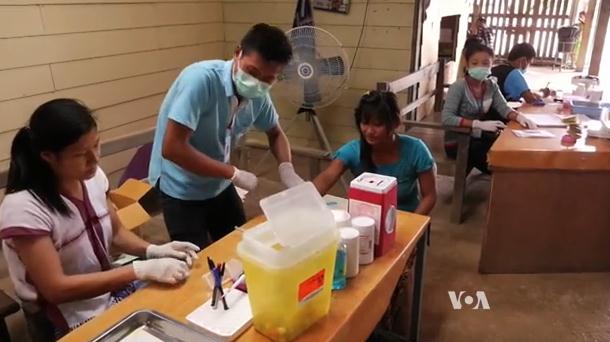VOA慢速英语: 抗药性疟疾在东南亚肆虐(双语)
[page]参考译文[/page]
Drug-Resistant Malaria Spreads in Southeast Asia
抗药性疟疾在东南亚肆虐
From VOA Learning English, this is the Health Report.
这里是美国之音慢速英语健康报道。
On Thailand’s border with Myanmar, also known as Burma, a malaria research and treatment center is increasing efforts to kill, or eliminate, a drug-resistant form of the parasite before it spreads abroad. VOA correspondent Steve Sandford reports from Thailand.
在泰国与缅甸的边境,一个疟疾研究和治疗中心在努力的消灭一种抗药性疟疾寄生虫,想要争取在其肆虐传播之前将其消除。美国之音驻地记者史蒂夫·桑福德在泰国报道。
A health center near a busy border crossing in Thailand has had great success over the last 20 years in reducing the effect of malaria.
在泰国繁忙的边境附近的一个医疗中心,过去的20年中,在减少疟疾的影响方面有着巨大的贡献。
Cases of the disease have greatly decreased. But doctors like Cindy Chu remain worried.
疟疾病例极大的减少,但是像辛迪初(Cindy Chu)这样的医生还依旧很担心。
“We used to see a lot of malaria at the Wangpha clinic but now with efforts of elimination and active surveillance and even the setting up of malaria posts on the other side of the border, the malaria rates have really gone down. So we don’t see as much malaria as we used to. On the other hand, the malaria that we do see is more complicated. And because of artemisinin resistance, the cases we see here require additional therapy.”
他说:“我们曾经在Wangpha门诊室看到很多疟疾患者,但是如今在努力的消除和积极的监测下,甚至在另一边的边境都设置了疟疾预防公告牌,疟疾的患病率是真的下降了。所以我们没有看到过去那么多的疟疾。另一方面,我们现在所面临的疟疾更为复杂。因为这些疟疾寄生虫具有对青蒿素(抗疟药)的耐药性,所以这里的疟疾病例还需要进行额外的治疗。”
Medicines called Artemisinin have been highly effective against malaria when used in combination with other drugs. Using a combination of drugs is called a “cocktail.”
抗疟疾药物青蒿素在联合其他药物一起使用时,非常有效。这些药物的组合名字被叫做“鸡尾酒”。
But in five countries in Southeast Asia -- Cambodia, Vietnam, Thailand, Myanmar and Laos -- the malaria organism, or parasite, has developed a resistance to the treatment. Drug-resistant means that the drug no longer treats the disease.
但是在东南亚的五个国家——柬埔寨、越南、泰国、缅甸和老挝中的疟疾寄生虫,已经对该组合药物的治疗具有耐药性。耐药性意味着这药不再能够治疗该疾病。
Doctors can still treat infected patients with stronger drug cocktails. But they worry that it is just a matter of time before those medicines also become ineffective.
医生仍然可以靠使用更强的“鸡尾酒”药物组合来治疗被感染的患者,但是他们担心,这些药物变得无效也只是一个时间问题。
Dr. Francois Nosten has been leading research on the Thai - Myanmar border for the past 30 years. He says that the clock is ticking, meaning time is running out.
弗朗索瓦医生主要对过去30年的泰国和缅甸边境进行研究。他称,时间紧迫,已经没时间了。
“This is a global public health emergency because we could see in our studies that the progression of resistance is quite fast. For example in 2007 none of the patients were infected with a resistant parasite. In 2012, 80% of the patients are infected with the resistant parasite, so in just a few years the majority of the infections are caused by the resistant parasite.”
他说:“这是一个全球突发性公共卫生事件,因为我们可以看到在我们的研究中,阻力的发展非常快。例如在2007年没有患疟疾的病人携带耐药性的疟疾寄生虫。到了2012年,80%的疟疾患者携带耐药性的疟疾寄生虫,所以在这仅仅几年的时间中,大多数的患者是被耐药性的疟疾寄生虫感染的。”
Dr. Nosten wants a stronger method of dealing with resistant malaria to control its spread. He wants to give medicine to whole villages where the parasite can lie inactive and unseen in many people.
他渴望有一个强大的方法可以应对这些耐药性的疟疾寄生虫,从而控制它们的传播。他想要把药品给所有那些寄生虫不活跃的村庄,以及很多并未携带寄生虫的人们。
“What we predict is in order to stop the progression of artemisinin resistance, we need to eliminate malaria. It’s not good to just reduce the number of cases, reduce the transmission of the disease, we need to eliminate the parasite.”
“我们做预防是为了阻止那些寄生虫青蒿素耐药性的继续发展,我们需要消除疟疾。只是减少患病数量,减少其传播并不是良策,我们要做的是消灭这种寄生虫。”
Medical teams are making plans to give anti-malarial drugs in villages where many cases of malaria have been reported. Many are hoping that this effort will stop the spread of an increasingly dangerous parasite.
医疗团队正计划着将抗疟疾的药物分发给各个村庄,并且各村里的很多疟疾病例也已经上报。很多人希望这一努力可以阻止越来越危险的寄生虫的传播。
I’m Anna Matteo.
我是安娜·马泰奥。
[page]听力原文[/page]
Drug-Resistant Malaria Spreads in Southeast Asia
From VOA Learning English, this is the Health Report.
On Thailand’s border with Myanmar, also known as Burma, a malaria research and treatment center is increasing efforts to kill, or eliminate, a drug-resistant form of the parasite before it spreads abroad. VOA correspondent Steve Sandford reports from Thailand.
A health center near a busy border crossing in Thailand has had great success over the last 20 years in reducing the effect of malaria.
Cases of the disease have greatly decreased. But doctors like Cindy Chu remain worried.
 |
“We used to see a lot of malaria at the Wangpha clinic but now with efforts of elimination and active surveillance and even the setting up of malaria posts on the other side of the border, the malaria rates have really gone down. So we don’t see as much malaria as we used to. On the other hand, the malaria that we do see is more complicated. And because of artemisinin resistance, the cases we see here require additional therapy.”
Medicines called Artemisinin have been highly effective against malaria when used in combination with other drugs. Using a combination of drugs is called a “cocktail.”
But in five countries in Southeast Asia -- Cambodia, Vietnam, Thailand, Myanmar and Laos -- the malaria organism, or parasite, has developed a resistance to the treatment. Drug-resistant means that the drug no longer treats the disease.
Doctors can still treat infected patients with stronger drug cocktails. But they worry that it is just a matter of time before those medicines also become ineffective.
Dr. Francois Nosten has been leading research on the Thai - Myanmar border for the past 30 years. He says that the clock is ticking, meaning time is running out.
“This is a global public health emergency because we could see in our studies that the progression of resistance is quite fast. For example in 2007 none of the patients were infected with a resistant parasite. In 2012, 80% of the patients are infected with the resistant parasite, so in just a few years the majority of the infections are caused by the resistant parasite.”
Dr. Nosten wants a stronger method of dealing with resistant malaria to control its spread. He wants to give medicine to whole villages where the parasite can lie inactive and unseen in many people.
“What we predict is in order to stop the progression of artemisinin resistance, we need to eliminate malaria. It’s not good to just reduce the number of cases, reduce the transmission of the disease, we need to eliminate the parasite.”
Medical teams are making plans to give anti-malarial drugs in villages where many cases of malaria have been reported. Many are hoping that this effort will stop the spread of an increasingly dangerous parasite.
I’m Anna Matteo.
- 频道推荐
- |
- 全站推荐
- 推荐下载
- 网站推荐




















